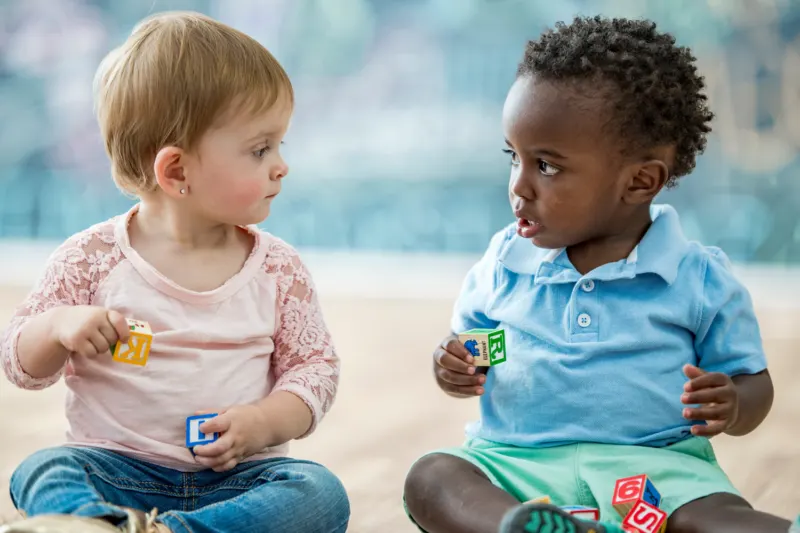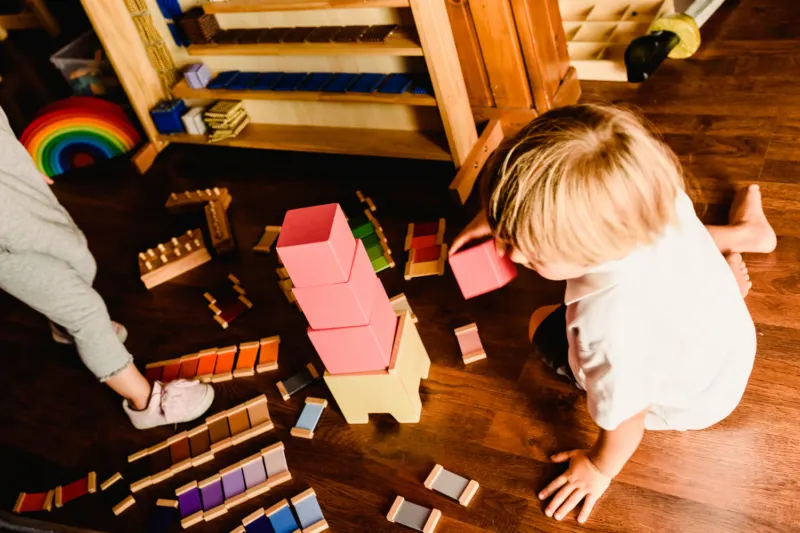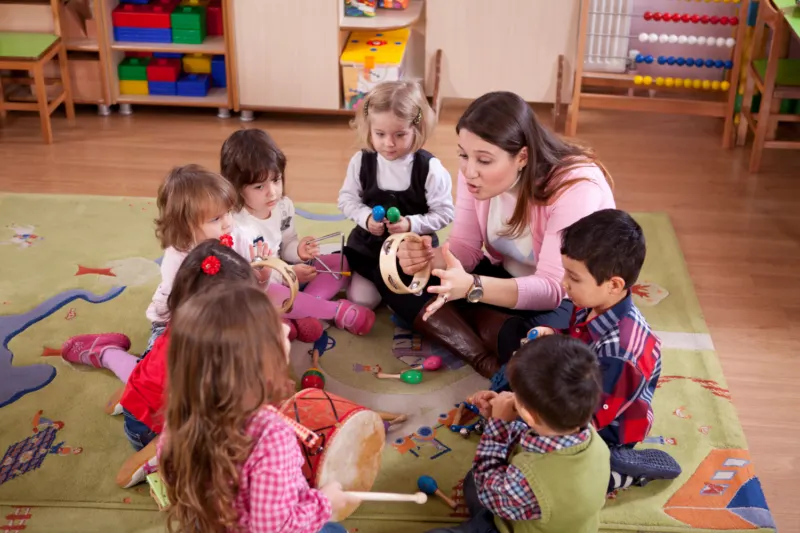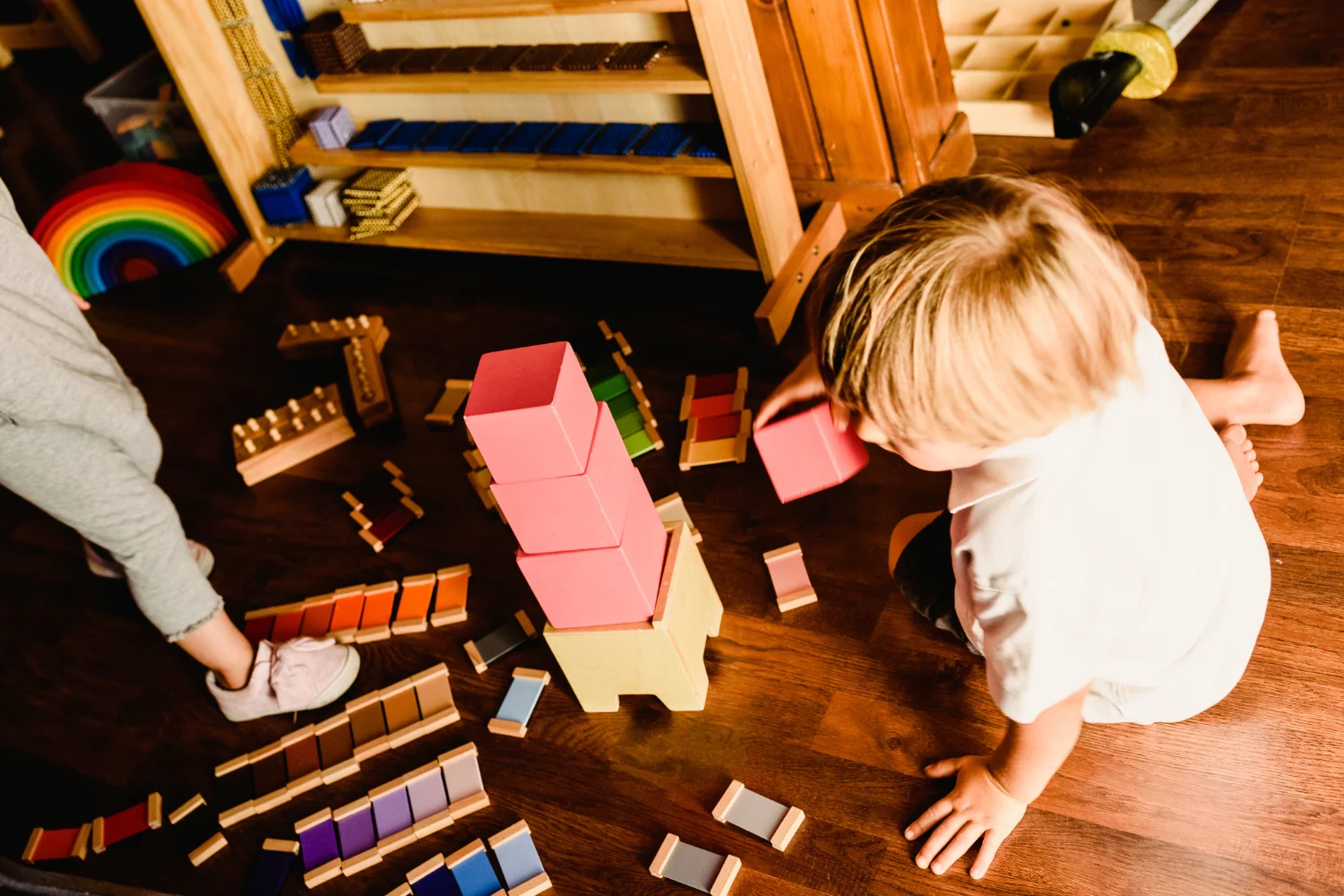Are you looking for a holistic approach to nurture your infant's early development? Look no further than Montessori for infants. This educational philosophy, developed by Maria Montessori, emphasizes the importance of fostering independence, self-confidence, and a lifelong love of learning from the earliest stages of life.
With a focus on the natural development of each child, Montessori for infants provides a carefully prepared environment that allows infants to explore, learn, and grow at their own pace. From sensory activities that stimulate their senses to practical life exercises that enhance motor skills, Montessori education offers a comprehensive and individualized approach to early childhood development.

By promoting a hands-on approach, Montessori for infants encourages the development of essential skills such as concentration, coordination, and problem-solving abilities. Using specially designed materials, infants actively discover and learn through their own efforts, building a sense of accomplishment and self-esteem.
With its emphasis on respect, independence, and freedom of choice, Montessori for infants lays the foundation for a lifelong love of learning. By nurturing their early development in a holistic and individualized manner, Montessori education sets infants on a path to becoming confident, capable, and independent learners.
What is Montessori Education?
Dr. Maria Montessori developed the Montessori education approach for early childhood education in the early 1900s. The belief holds that children learn best when they actively explore and discover the world around them at their own pace. This educational philosophy recognizes that each child is unique and has their own individual needs and interests.
In a Montessori classroom, infants actively choose activities that interest them. The role of the teacher is to guide and support the child in their learning journey, rather than dictating what they should learn and when. Montessori teachers actively prepare classrooms to encourage independent exploration and discovery.

The Benefits of Montessori for Infants
Montessori education offers numerous benefits for infants. One of the key benefits is the emphasis on fostering independence and self-confidence. In a Montessori classroom, infants actively choose their own activities and work at their own pace. This not only allows them to develop a sense of autonomy but also encourages them to take ownership of their own learning.
Another important benefit of Montessori education for infants is the focus on the development of essential life skills. Practical life exercises, such as pouring, spooning, and sorting activities, not only enhance fine motor skills but also help infants develop concentration, coordination, and problem-solving abilities. These skills lay the foundation for future learning and development.
Furthermore, Montessori education promotes a love of learning from an early age. By allowing infants to explore and discover the world around them in a hands-on manner, they develop a natural curiosity and enthusiasm for learning. This love of learning is a lifelong gift that will serve them well throughout their educational journey.

The Montessori Approach to Early Development
The Montessori approach actively centers on the belief that children can learn and develop from birth. It recognizes that infants have an innate drive to explore and discover the world around them and provides them with the tools and opportunities to do so.
Central to the Montessori approach is the concept of the absorbent mind. Maria Montessori observed that infants have an incredible capacity to absorb information from their environment effortlessly. They have a natural ability to learn languages, develop movement, and refine their senses during the first few years of life.
To support this natural development, Montessori education provides infants with carefully designed materials and activities that stimulate their senses and encourage exploration. Montessori classrooms offer infants abundant opportunities to learn and grow, providing tactile materials to promote sensory development and language materials to support early language acquisition.

Montessori for Infants: Activities
Montessori activities actively promote sensory exploration, motor skills development, and cognitive growth in infants. Here are some examples of Montessori activities that are suitable for infants:
Sensory Bottles
Fill bottles with various materials such as rice, beans, or fabric scraps. Infants can explore the different textures and sounds by shaking and manipulating the bottles.
Object Permanence Boxes
Introduce infants to the concept of object permanence by hiding objects inside boxes with holes. Infants can practice reaching and grasping the objects, developing their fine motor skills and understanding of cause and effect.
Object permanence boxes are designed to help infants develop an understanding of object permanence. These boxes typically have a removable lid and a hole for the infant to reach into and grasp objects.
Mirror Play
Set up child-safe mirrors at the infant's eye level. Infants can observe their own reflection, promoting self-awareness and developing their visual perception skills.
These activities provide opportunities for infants to engage in independent exploration, develop their fine motor skills, and stimulate their senses. By offering a variety of age-appropriate activities, Montessori education supports the holistic development of infants.
Montessori Ball Tracker
Attach a ball to a string on a play gym or mobile. This helps with tracking movements and developing visual coordination.
Texture Baskets
Offer baskets with items of different textures, such as soft fabrics, wooden blocks, or rattles. Babies
Creating a Montessori-Inspired Environment at Home
While Montessori education often relates to classroom settings, you can also create a Montessori-inspired environment at home. Here are some tips for setting up a Montessori-inspired space for your infant:
Create a Prepared Environment
Designate a specific area in your home for your infant's activities. Keep the space clutter-free and organized, with low shelves and baskets for easy access to materials and toys.

Offer Open-Ended Toys and Materials
Choose toys and materials that allow for open-ended play and exploration. Avoid toys that are overly stimulating or have a single purpose. Instead, opt for toys that encourage creativity and problem-solving.
Encourage Independence
Provide opportunities for your infant to practice independence. For example, set up a low table and child-sized chair for meal times, and offer child-sized utensils for self-feeding.
By creating a Montessori-inspired environment at home, you can support your infant's natural development and foster independence and learning.
Montessori for Infants: Materials
Montessori materials are an essential component of the Montessori approach to education. Designed to be self-correcting and hands-on, these materials allow infants to learn through their own exploration and discovery. Here are some examples of Montessori materials that are suitable for infants:
Montessori Mobiles
Designers create mobiles to stimulate an infant's visual and tactile senses, typically hanging them above the infant's crib or play area with simple, contrasting shapes and colors.
Stacking and Nesting Toys
Stacking and nesting toys help infants develop their fine motor skills and hand-eye coordination. These toys typically consist of a set of different-sized cups or blocks that can be stacked or nested together.
These materials actively support the infant's natural development and offer opportunities for independent exploration and learning.

Montessori-Trained Caregivers and Teachers
In a Montessori classroom or home environment, the role of the caregiver or teacher is crucial. Montessori-trained caregivers and teachers have a deep understanding of child development and the Montessori philosophy. They actively observe and guide infants on their learning journey, offering essential support and encouragement.
Montessori training programs provide caregivers and teachers with the knowledge and skills to create a prepared environment, select appropriate materials, and observe and respond to the needs of the infants in their care. They learn how to foster independence, promote a love of learning, and create a nurturing and supportive environment for infants.
If you’re considering Montessori education for your infant, choose caregivers or teachers trained in the Montessori method. Their expertise and understanding of the philosophy will ensure that your infant receives the best possible start in their educational journey.

Montessori Schools for Infants
Montessori schools that cater specifically to infants offer a unique and enriching educational experience. These schools actively create a carefully prepared environment to meet infants' developmental needs. The classrooms are equipped with age-appropriate materials and activities that promote independence, exploration, and learning.
In a Montessori school for infants, the focus is on providing a nurturing and supportive environment where infants can develop at their own pace. The curriculum is designed to support the holistic development of each child, with an emphasis on fostering independence, self-confidence, and a love of learning.
When choosing a Montessori school for your infant, it is important to research and visit different schools to find one that aligns with your values and expectations. Look for a school with experienced and trained Montessori teachers, a well-prepared environment, and a strong emphasis on the Montessori philosophy.
Montessori Resources for Parents
As a parent, there are many resources available to support you in embracing the Montessori philosophy for your infant's development. From books and websites to parent education workshops, these resources provide valuable information and guidance on how to incorporate Montessori principles into your daily life.
Montessori Books
“The Montessori Toddler” by Simone Davies and “Montessori from the Start: The Child at Home, from Birth to Age Three” by Paula Polk Lillard and Lynn Lillard Jessen are highly recommended books for parents interested in Montessori education.
Montessori Websites
Websites such as Montessori.org and AMI-USA.org offer a wealth of information on the Montessori approach and provide resources for parents.
Parent Education Workshops
Many Montessori schools and organizations offer parent education workshops and classes. These workshops provide an opportunity to learn more about the Montessori philosophy and gain practical tips for incorporating Montessori principles into your home environment.
By utilizing these resources, you can gain a deeper understanding of the Montessori philosophy and find practical ways to support your infant's development at home.

Embracing the Montessori Philosophy for Infant Development
Montessori for infants offers a holistic and individualized approach to early childhood development. By promoting independence, self-confidence, and a love of learning, Montessori education sets infants on a path to becoming confident, capable, and independent learners.
Through carefully prepared environments, hands-on activities, and Montessori materials, infants are given the opportunity to explore, learn, and grow at their own pace. With the support of trained caregivers and teachers, infants develop essential skills such as concentration, coordination, and problem-solving abilities.
Whether you choose to enroll your infant in a Montessori school or create a Montessori-inspired environment at home, embracing the Montessori philosophy can have a profound impact on your infant's early development. By nurturing their innate curiosity and providing them with the tools and opportunities to learn and grow, you are setting them on a path to a lifelong love of learning.
